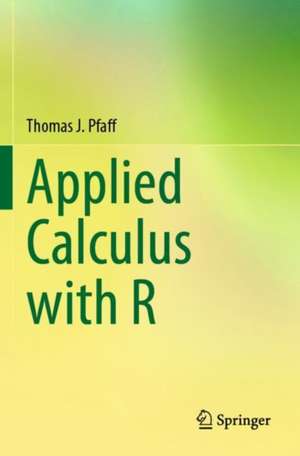Applied Calculus with R
Autor Thomas J. Pfaffen Limba Engleză Paperback – 5 iun 2024
This textbook integrates scientific programming with the use of R and uses it both as a tool for applied problems and to aid in learning calculus ideas. Adding R, which is free and used widely outside academia, introduces students to programming and expands the types of problems students can engage. There are no expectations that a student has any coding experience to use this text.
While this is an applied calculus text including real world data sets, a student that decides to go on in mathematics should develop sufficient algebraic skills so that they can be successful in a more traditional second semester calculus course. Hopefully, the applications provide some motivation to learn techniques and theory and to take additional math courses. The book contains chapters in the appendix for algebra review as algebra skills can always be improved. Exercise sets and projects are included throughout with numerous exercises based on graphs.
| Toate formatele și edițiile | Preț | Express |
|---|---|---|
| Paperback (1) | 359.33 lei 3-5 săpt. | +39.80 lei 6-10 zile |
| Springer International Publishing – 5 iun 2024 | 359.33 lei 3-5 săpt. | +39.80 lei 6-10 zile |
| Hardback (1) | 465.11 lei 3-5 săpt. | +42.39 lei 6-10 zile |
| Springer International Publishing – 5 iun 2023 | 465.11 lei 3-5 săpt. | +42.39 lei 6-10 zile |
Preț: 359.33 lei
Preț vechi: 413.03 lei
-13% Nou
Puncte Express: 539
Preț estimativ în valută:
68.77€ • 71.04$ • 57.23£
68.77€ • 71.04$ • 57.23£
Carte disponibilă
Livrare economică 05-19 martie
Livrare express 18-22 februarie pentru 49.79 lei
Preluare comenzi: 021 569.72.76
Specificații
ISBN-13: 9783031285738
ISBN-10: 3031285735
Pagini: 532
Ilustrații: XIV, 532 p. 269 illus., 151 illus. in color.
Dimensiuni: 155 x 235 x 30 mm
Greutate: 0.92 kg
Ediția:2023
Editura: Springer International Publishing
Colecția Springer
Locul publicării:Cham, Switzerland
ISBN-10: 3031285735
Pagini: 532
Ilustrații: XIV, 532 p. 269 illus., 151 illus. in color.
Dimensiuni: 155 x 235 x 30 mm
Greutate: 0.92 kg
Ediția:2023
Editura: Springer International Publishing
Colecția Springer
Locul publicării:Cham, Switzerland
Cuprins
A Brief Introduction to R.- Describing a Graph.- The Function Gallery.- I: Change and the Derivative.- How Fast is CO2 Increasing?.- The Idea of the Derivative.- Formulas Quantifying Change.-The Microscope Equation.- Successive Approximations to Estimate Derivatives.- The Derivative Graphically.- The Formal Derivative as a Limit.- Basic Derivative Rules.- Produce Rule.- Quotient Rule.- Chain Rule.- Derivatives with R.- End Behavior of a Function - L'Hospital's Rule.- II: Applications of the Derivative.- How Do We Know the Shape of a Function?.- Finding Extremes.- Optimization.- Derivatives of Functions of Two Variables.- Related Rates.- Surge Function.- Differential Equations - Preliminaries.- Differential Equations - Population Growth Models.- Differential Equations - Predator Prey.- Differential equations - SIR Model.- Project: The Gini Coefficient - Prelude to Section III.- III: Accumulation and the Integral.- Area Under Curves.- The Accumulation Function.- The Fundamental Theorem of Calculus.- Techniques of Integration - The u Substitution.- Techniques of Integration - Integration by Parts.- IV: Appendices - Algebra Review.- Algebra Review - Functions and Graphs.- Algebra Review - Adding and Multiplying Fractions.- Algebra Review - Exponents.- Algebra Review - Lines.- Algebra Review - Expanding, Factoring, and Roots.- Algebra Review - Function Composition.- Glossary.- Answers to Odd Problems.- R Code for Figures.
Notă biografică
Thomas J. Pfaff is chair and professor of mathematics at Ithaca College and previously served as the all-college Honors director. He maintains the blog and website sustainabiliytmath.org and is the author of R for College Mathematics and Statistics.
Textul de pe ultima copertă
This textbook integrates scientific programming with the use of R and uses it both as a tool for applied problems and to aid in learning calculus ideas. Adding R, which is free and used widely outside academia, introduces students to programming and expands the types of problems students can engage. There are no expectations that a student has any coding experience to use this text.
While this is an applied calculus text including real world data sets, a student that decides to go on in mathematics should develop sufficient algebraic skills so that they can be successful in a more traditional second semester calculus course. Hopefully, the applications provide some motivation to learn techniques and theory and to take additional math courses. The book contains chapters in the appendix for algebra review as algebra skills can always be improved. Exercise sets and projects are included throughout with numerous exercises based on graphs.
Caracteristici
Includes more graph-based problems Exercise sets included Includes real-world models throughout
